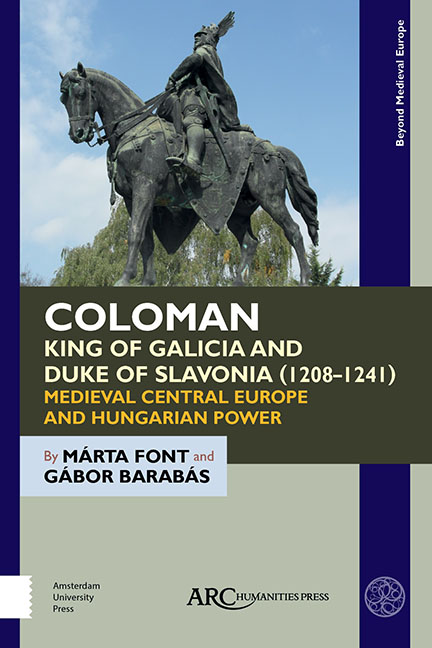 Coloman, King of Galicia and Duke of Slavonia (1208–1241)
Coloman, King of Galicia and Duke of Slavonia (1208–1241) Book contents
- Frontmatter
- Contents
- List of Illustrations
- Foreword
- Introduction
- PART ONE COLOMAN AS CHILD RULER OF GALICIA
- Chapter 1 The Galician Context in 1205
- Chapter 2 The Agreement of Scepus
- Chapter 3 Coloman’s Coronation as King of Galicia: Date and Place
- Chapter 4 The Hungarian Elite and Coloman’s Court
- Chapter 5 Coloman’s Position in Halych, 1215–22: Campaigns and Opponents
- Chapter 6 Upholding the Galician Claim: Coloman’s Place in Hungary
- PART TWO COLOMAN, DUKE OF WHOLE SLAVONIA (1226–1241)
- Chapter 7 Coloman and Scepus, Before 1226
- Chapter 8 Coloman as Duke of Whole Slavonia from 1226
- Chapter 9 Coloman’s Status and the Inner Workings of the Duchy
- Chapter 10 Coloman’s Ecclesiastical and Secular Actitivities in Slavonia
- Chapter 11 Coloman’s Rule in Slavonia
- Chapter 12 Politics and Dynastic Affairs
- Chapter 13 Challenges in the Balkans
- Chapter 14 The Mongol Attack and Coloman’s Death
- Conclusion: Coloman in the Eyes of Posterity
- Bibliography
- Index
Chapter 13 - Challenges in the Balkans
Published online by Cambridge University Press: 20 November 2020
- Frontmatter
- Contents
- List of Illustrations
- Foreword
- Introduction
- PART ONE COLOMAN AS CHILD RULER OF GALICIA
- Chapter 1 The Galician Context in 1205
- Chapter 2 The Agreement of Scepus
- Chapter 3 Coloman’s Coronation as King of Galicia: Date and Place
- Chapter 4 The Hungarian Elite and Coloman’s Court
- Chapter 5 Coloman’s Position in Halych, 1215–22: Campaigns and Opponents
- Chapter 6 Upholding the Galician Claim: Coloman’s Place in Hungary
- PART TWO COLOMAN, DUKE OF WHOLE SLAVONIA (1226–1241)
- Chapter 7 Coloman and Scepus, Before 1226
- Chapter 8 Coloman as Duke of Whole Slavonia from 1226
- Chapter 9 Coloman’s Status and the Inner Workings of the Duchy
- Chapter 10 Coloman’s Ecclesiastical and Secular Actitivities in Slavonia
- Chapter 11 Coloman’s Rule in Slavonia
- Chapter 12 Politics and Dynastic Affairs
- Chapter 13 Challenges in the Balkans
- Chapter 14 The Mongol Attack and Coloman’s Death
- Conclusion: Coloman in the Eyes of Posterity
- Bibliography
- Index
Summary
COLOMAN HAD TO face various severe challenges after 1226 due to the geographical location of his duchy. As duke of Slavonia he had to handle affairs in the Balkans, or more specifically the Hungarian interest there, especially in Bosnia. The issue of the Bosnian heretics and the threat of the Dalmatian pirates were of greater relevance for Coloman; his possible campaign to Bosnia was probably one of the greatest enterprises of his lifetime. But in a wider sense his politics can be seen to be aligned with the traditional tendency of Hungarian expansion southwards since the late eleventh century.
The Bosnian Heresy
The Bosnian heresy, or the so-called Bosnian Church, is held traditionally to be a dualistic teaching related to the Bogomils and the Cathars. The complex nature of the situation caused by the presence of the heretics makes it necessary to take a wider, contextual perspective, not focusing alone on Coloman's deeds. We shall not examine here the doctrines of the Bosnian heresy; it is enough to know that scholars now doubt a direct relation between the Bosnian Church and dualist teachings. The influence of the Bogomils or the Cathars cannot be excluded completely, but it was certainly intermixed with Eastern monasticism and popular beliefs.
The fight against the heresy had become central in papal–Hungarian relations by the early thirteenth century; Pope Innocent III was in regular contact with Hungarian rulers due to various plans concerning the matter, whilst the pope was also interested in restoring union of the Eastern, or orthodox, churches with Rome. Coloman had confronted this split in the universal church as king of Galicia, a “schismatic” territory. It is not known whether Innocent III had an underlying plan when he granted permission for Coloman's coronation there, but he was no doubt keen to expand Roman authority into this region. Members of the Hungarian royal family were given key roles in papal policy. Prince Béla actively supported the Dominican mission among the nomadic Cumans and helped the establishment of a missionary bishopric while he was the duke of Transylvania, and Coloman was given responsibility for the Bosnian heresy as duke of Slavonia.
- Type
- Chapter
- Information
- Coloman, King of Galicia and Duke of Slavonia (1208–1241)Medieval Central Europe and Hungarian Power, pp. 115 - 120Publisher: Amsterdam University PressPrint publication year: 2019
